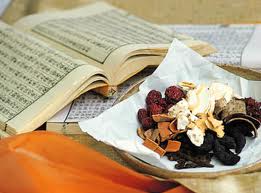 Preparing Tea or Tinctures
Preparing Tea or Tinctures
A tea or decoction (Chinese “tang”) is probably the most common way that herbs are used in China. A tea is an extract of the herb. Water acts as the solvent for the herbs and the heating process pulls or extracts the medicinal components of the herbs into the water. Once it is cooked you drink the tea. Teas are an effective way to use herbs as you can modify the formula to your particular needs and they are rapidly absorbed. This is a good way to use herbs if you don’t mind the taste of the herbs or the time involved in preparation.
Here’s how you make a tea: Measure four cups of water, add your herbs and bring to a boil. Boil vigorously for five minutes. Then turn down the heat and simmer for 25 minutes. There will be some evaporation in the process. Once the tea is cooked, drink one cup twice a day. You should have some left over for the next day. Refrigerate this. The tea could spoil if left out too long. The next day warm up the tea before drinking. Don’t drink it cold. When the liquid is all used up add four more cups of water and repeat the cooking process. All herbs can be cooked twice. You should note that if you have a formula with a large number or volume of herbs, four cups of water may not be enough to cook it. In this case, fill your pot with water so that there is about one inch of liquid covering the herbs. Then cook the same way. When you cook herbs don’t use aluminum. Nonmetallic pots are preferred, such as Corning ware or porcelain, however, if you don't have those a stainless steel pot will work. Most roots and rhizomes need to be cooked for the full 30 minutes. Some of the lighter materials such as Menthe (Mint) or Ephedra, need to be cooked a short time. Add them in the last ten minutes of cooking your formula.
Other common methods of making herbs include pills (wan); powders (san), elixirs (dan), syrups (gao); plasters (gao) and medicinal wines (jiu).
Tinctures and Alcohol Extracts
Tinctures:
A tincture would be considered a medicinal wine. Keep in mind that what the Chinese call “wine” is very much stronger than what we call wine. Bai Jiu, which is a common wine in China is very potent and you drink it in very small glasses. To make a tincture, you need to buy a high proof alcoholic beverage, add the herbs and let them soak for two months minimum. The longer they soak, the better. Ideally you should agitate (shake) the container once a day. Once it is ready you drink a small amount daily or as needed. Good tonic herbs for soaking include, ginseng, antler, lycii, and carthami. You can use up to one pound of material per gallon of alcohol in a tincture. If you need ideas for formulas you should read A Handbook of Chinese Healing Herbs. When you are preparing your formula you should place the herbs in a larger glass container like a Quart size canning jar or a gallon-size glass jar. Don’t prepare tinctures in a plastic container.
Extracts:
People often confuse extracts and tinctures. Tinctures are made by soaking the herb in a high proof alcoholic beverage for several months. An alcohol extract is made by a similar process, however, heat is usually involved in making an extract and larger quantities of herbs are used to increase the concentration. Using low heat in the process pulls more of the medicinal components from the herbs in a reduced amount of time. However, don’t try heating alcohol at home! Alcohol is flammable and heating it without the specialized equipment necessary is very dangerous!
In manufactured products the Long Hay Flat brand extracts are very potent. You generally need to use only 5-20 drops of one of these products compared with the 20-30 drops most other brands recommend. The manufacture of these products uses a mixture of water and alcohol in a closed system. During the process the solvents (water and alcohol) continually wash finely ground herb material at a carefully maintained temperature for four days. It is a total extraction that delivers everything that was in the original herb, even substances not generally assimilable from tablets or other extracts. Depending on the formula being processed they use from five to eight pounds of herbs to produce a gallon of finished product. This is significantly more than the industry standard of four pounds of herb material per gallon.
There are a number of good books on using herbs but if you really want to get serious you should definitely get “Chinese Herbal Medicine: Materia Medica“ and “Chinese Herbal Medicine: Formulas and Strategies“. Both of these books are exceptional resources for learning about herbs. Another good book is “Japanese Herbal Medicine: The Healing Art of Kampo”
We will definitely advise you on how to cook your particular herbal formula.
